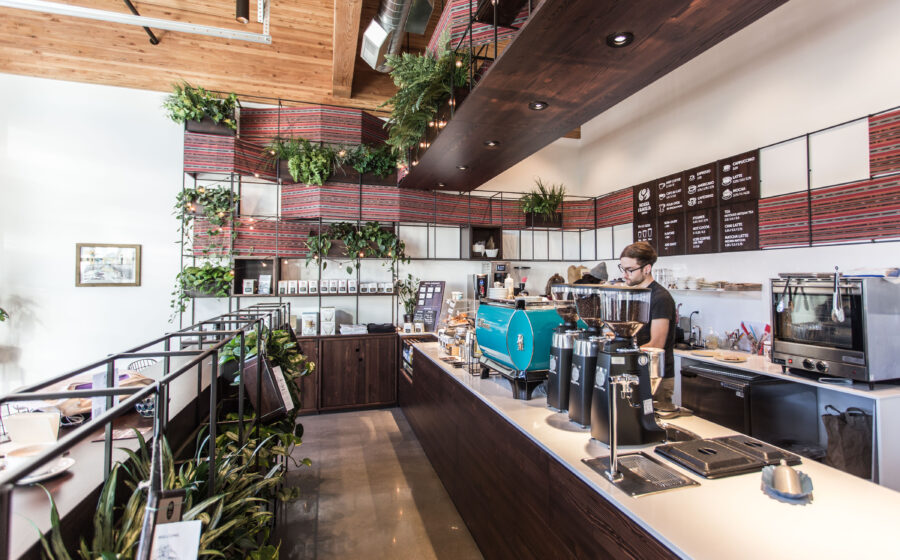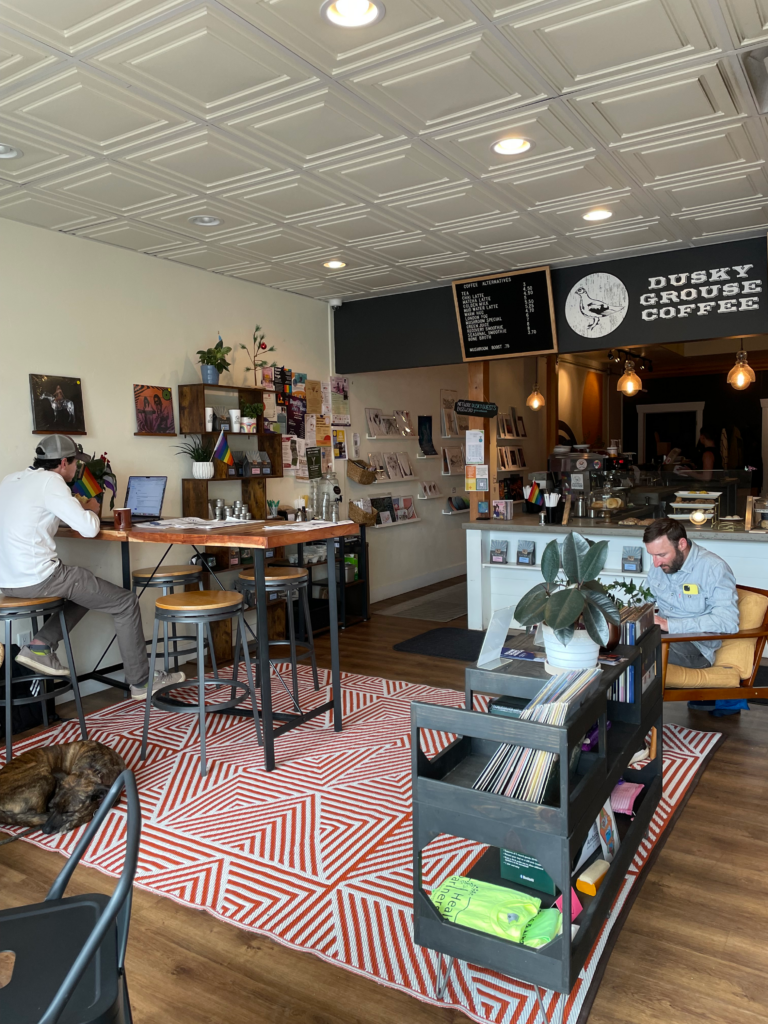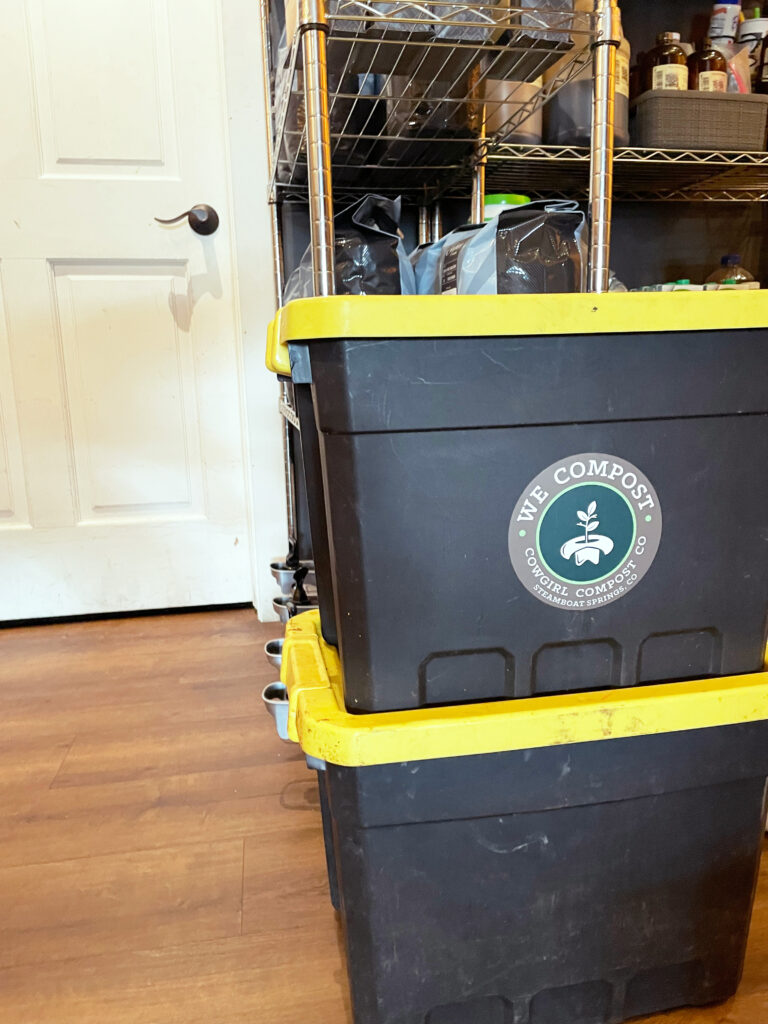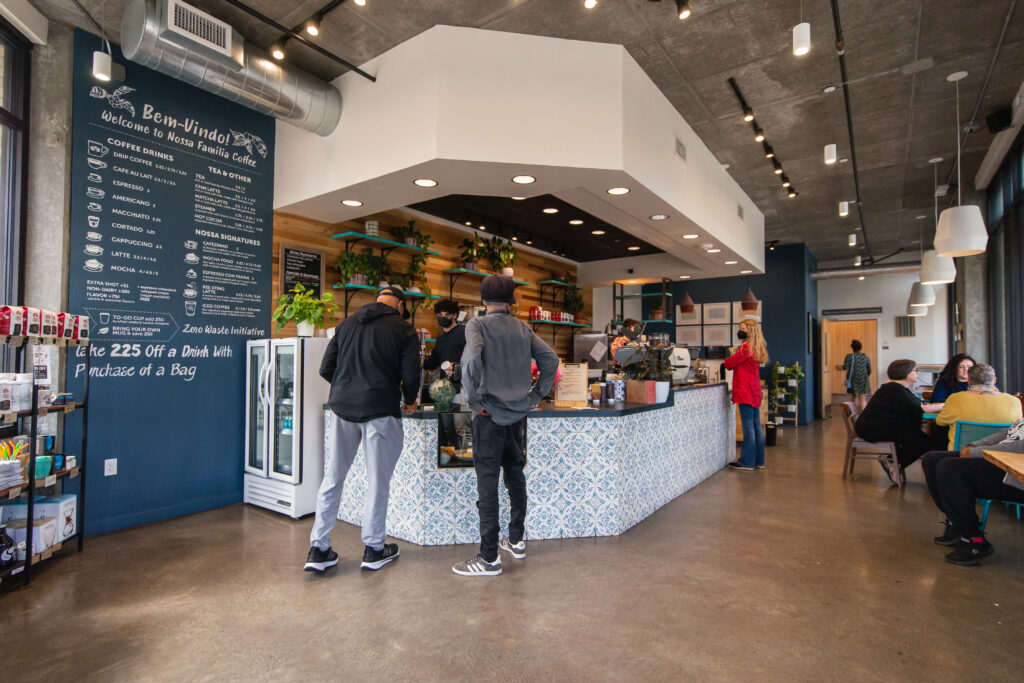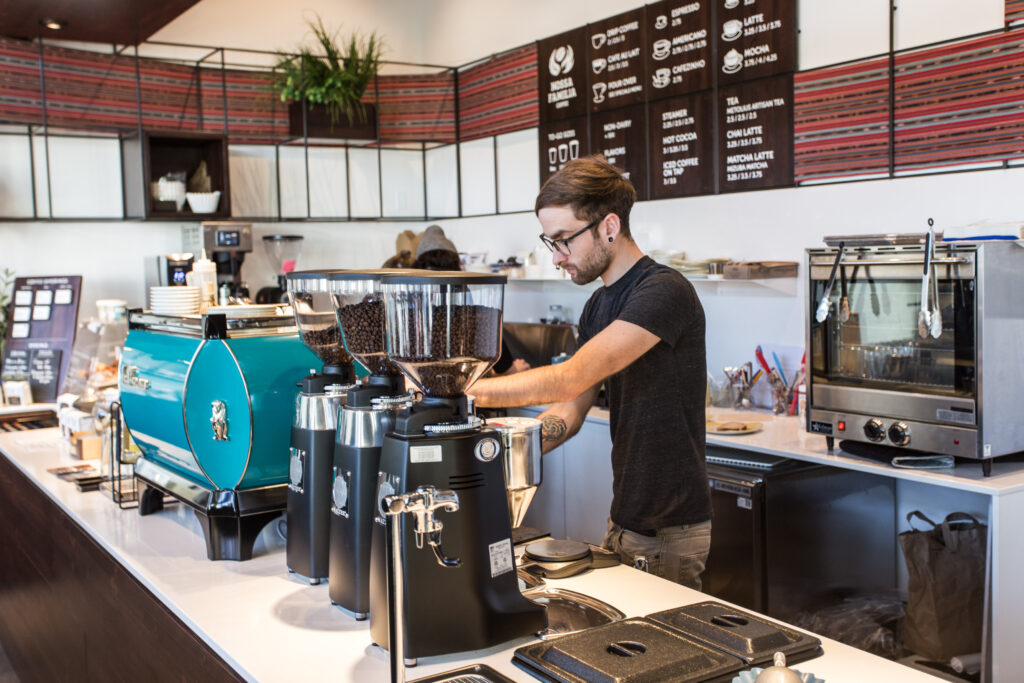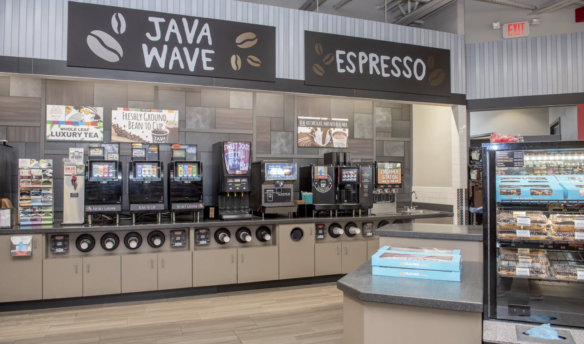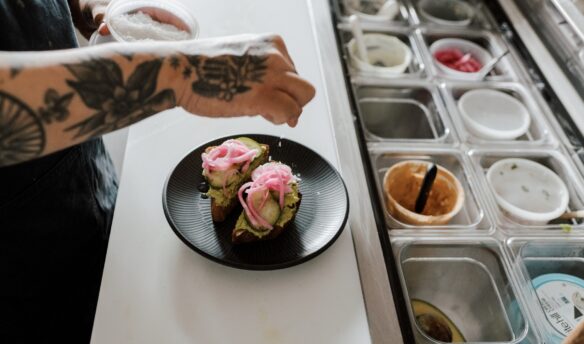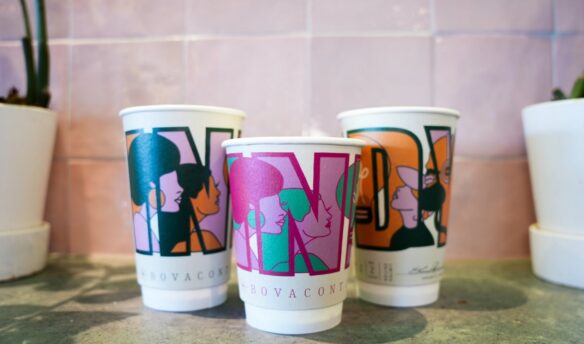In 2018, Nossa Familia, a certified B Corp coffee company, announced a new initiative at their Seven Corners location in Portland, Oregon: the “zero-waste cafe” program.
The initiative included several new policies to cut down on waste, and one of the most notable steps was to offer a 25-cent discount to customers who bring in a reusable mug for their coffee. According to the International Coffee Organization, approximately 600 billion paper and plastic cups are used worldwide yearly. In the United States alone, an estimated 50 billion paper coffee cups with lids get discarded annually—Nossa Familia’s initiative was their way to address this problem.
Nossa Familia kicked off the new policies in 2019 with promising results. “We saw a 22% reduction in the amount of paper cup waste because of that initiative,” says Jocelyn SyCip, their marketing and design manager.
And then the pandemic hit. Like many cafés, Nossa Familia switched to using single-use cups and put the program on hold for 18 months. But despite the setbacks of COVID-19, Nossa Familia’s initiatives demonstrate that customers are excited and willing to be amenable to policies that increase sustainability. Research backs this up: a recent study by Kearney revealed that 66% of consumers are willing to bring their mugs to coffee shops—incentives like Nossa Familia’s cup discount can help bridge the gap between aspiration and action.
Customers care about sustainability, so how can cafés make engaging in responsible practices easier for them? Furthermore, how can cafés assume more responsibility for implementing sustainable systems? Much of the discussion around sustainability puts the burden on individual actors, but many cafés are working towards removing the onus solely off customers and taking proactive steps to reduce their environmental footprint behind the bar.
From Scraps to Soil
In August 2021, Stephany Traylor brought Dusky Grouse Coffee to the scene in Steamboat Springs, Colorado. Traylor wanted to seriously consider how the café would tackle sustainability and explored creative ways to minimize her cafe’s environmental footprint. One of her first steps was implementing a zero-waste coffee program in collaboration with Cowgirl Compost, a local compost company. “We have two different compost bins in our shop—one for our coffee grinds and one for food waste,” says Traylor.
By composting organic waste, Dusky Grouse has eliminated one of the heaviest waste items from their coffee shop: those soggy, water-logged coffee grounds. With the expansion of its composting program, Cowgirl Compost will soon be using the shop as a community compost drop-off location—patrons can sign up for composting services and drop off compost at the cafe. “It’s one more incentive for people to come in through our doors,” shares Traylor.
When the community compost program is launched, Dusky Grouse plans to support their team’s sustainable practices by covering the cost of their first month of composting services if they sign up. As an additional perk, team members who use the shop as their compost drop-off site will receive a $25 reward.
According to Traylor, this program is a win-win for everyone involved. “Our team members are already coming to work, so it’s super convenient for them to drop off their compostable materials at our shop,” she says, “It’s great for us because it helps us reduce our waste even further.”
Small Steps, Big Impact
Traylor recognizes the importance of incorporating environmentally-friendly practices into her cafe but knows long-term sustainability requires time and careful implementation. “Every coffee shop looks different. And because we are so new, I have to pick my battles right now,” she says. According to Traylor, she looked to other larger shops for sustainability practices and has been working on supply chain issues, being mindful of packaging, and choosing vendors carefully.
But she acknowledges that the most significant sustainability challenge lies in packaging and how difficult it can be to recycle things like milk jugs and cartons for plant-based milks. “Maybe they’re recyclable in bigger metropolitan areas,” she says, “but even recycling isn’t the best use of energy when you think about the energy it takes to process and move the goods,” she explains.
“Reduce. Reuse. Recycle.” This iconic phrase isn’t just a catchy slogan—it reveals the order of importance and where the most significant environmental impact lies in a product life cycle. While recycling is pivotal in diverting waste from landfills and preserving valuable resources, focusing on reduction and reuse strategies can amplify its value.
In 2018, approximately 14% of all plastic containers and packaging generated were recycled, totaling nearly 2 million tons of waste. Most plastic containers and packaging waste wound up in landfills, and the remaining portion was burned or combusted. Instead of urging people to recycle more, businesses can look to the beginning of the “Reduce. Reuse. Recycle.” slogan to think of innovative ways to conserve resources.
Traylor decided to invest in a commercial-grade milk machine to create in-house nut milk, partially to reduce Dusky Grouse’s reliance on plant milks delivered in carton packaging. However, she’s still working on nailing down the recipe. “With oat milk and almond milk being close to half of all our transactions, it has to be really good for me to sell it,” she says. “It’s still at the forefront—I’m just not quite there yet.”
Nossa Familia has taken sustainability to heart. “As a B Corp, we’re really thinking about sustainability across everything we do,” says SyCip. But it’s not just about the label: the owner’s background as a fifth-generation coffee farmer from Brazil enables them to work directly with family farms and origin partners that share their environmental impact goals. They also utilize gas-powered Loring roasters that recycle hot air from the drum, eliminating the need for an afterburner. These roasters save over 80% in energy use and emissions output by incinerating the smoke from roasting.
Nossa Familia prioritizes sustainable sourcing practices and takes eco-friendliness seriously in its roastery and delivery operations. They use biodegradable coffee bags and 100% recyclable boxes for packaging, while their all-electric, zero-emissions delivery fleet ensures their coffee reaches their cafés and wholesale accounts with minimal environmental impact.
“We’re thinking about how we can reduce waste and be sustainable across everything we do,” SyCip says. “We think about how we can reduce our footprint by working locally, just in terms of sourcing—and then also thinking about our vendors’ sourcing behavior.”
Crafting an Eco-Conscious Drink Menu
Nossa Familia is also finding innovative ways to incorporate plant-based milk options into their menus. Nossa Familia wanted to take its eco-friendly ethos to the café menu, so they partnered with GloryBee Honey, an Oregon-based B Corp company dedicated to saving bees, to create a handful of signature drinks.
One of their most popular drinks featuring GloryBee Honey is the Bee Sting, created by one of Nossa Familia’s baristas. This latte riff can be made with any plant-based milk and incorporates a recipe based on their signature Mocha Fogo: a spicy mocha infused with cardamom, cinnamon, and a touch of cayenne. Instead of chocolate, the Bee Sting gets topped with a generous drizzle of GloryBee honey.
Along with crafting drinks made with products from local suppliers, Dusky Grouse is crafting menu items around their house-made syrups. “We try to do as much in-house as possible to eliminate the shipping for glass bottles,” says Traylor.
Dusky Grouse patrons will find dried pasta noodles available for their drinks instead of single-use stirrers, which can be composted after use. “Alfredo noodles are stiff enough that you could just stir your coffee with it and then compost it,” she explains. Another strategy Traylor uses is growing herbs in a garden just outside the shop, including chives for their scones and lavender for their house-made syrups.
Do these efforts make a difference when it comes to sustainability? Traylor believes that no matter how small the effort, making visible choices that customers can engage with and appreciate can inspire others. “I think it opens up conversations with the community and our team,” she says. “If people think about the bigger things they can do and feel inspired to vote, write letters to politicians, and be educated—that’s where you can make a big difference.”
SyCip acknowledges that progress can be slow and imperfect and that change will only happen if everyone is involved in the conversation. She’s encouraged by Nossa Familia’s founder, who regularly publishes information about the company’s waste on their blog, even if it is disappointing—in a post published in April 2023, Nossa Familia reported that they’re generating 18% more cup waste than when they implemented their Zero Waste initiative in 2019, highlighting their struggles to get back on track due to the pandemic. “We need to share this information with people and let them know we’re not doing as well as we thought,” she says.
But progress over perfection remains the name of the game at Nossa Familia. SyCip acknowledges that zero waste may seem like a pie-in-the-sky goal, but it is still an ambitious one worth striving for. “It’s not going to happen unless we’re really honest with ourselves and invite our community to be a part of that solution.”
Cafes like Nossa Familia and Dusky Grouse demonstrate there are ways to take on responsibility and prioritize customer convenience, aiming to foster a collective effort that brings about real and meaningful change rather than pushing the burden of sustainability solely onto patrons. Many of their initiatives are easy to implement but require looking around your space and seeing where inefficiencies are leading to waste, or creative solutions behind the bar could cut down on resources. By recognizing the steps they can take behind the bar to reduce waste, these businesses actively contribute to making a difference and inspire others to do the same.



